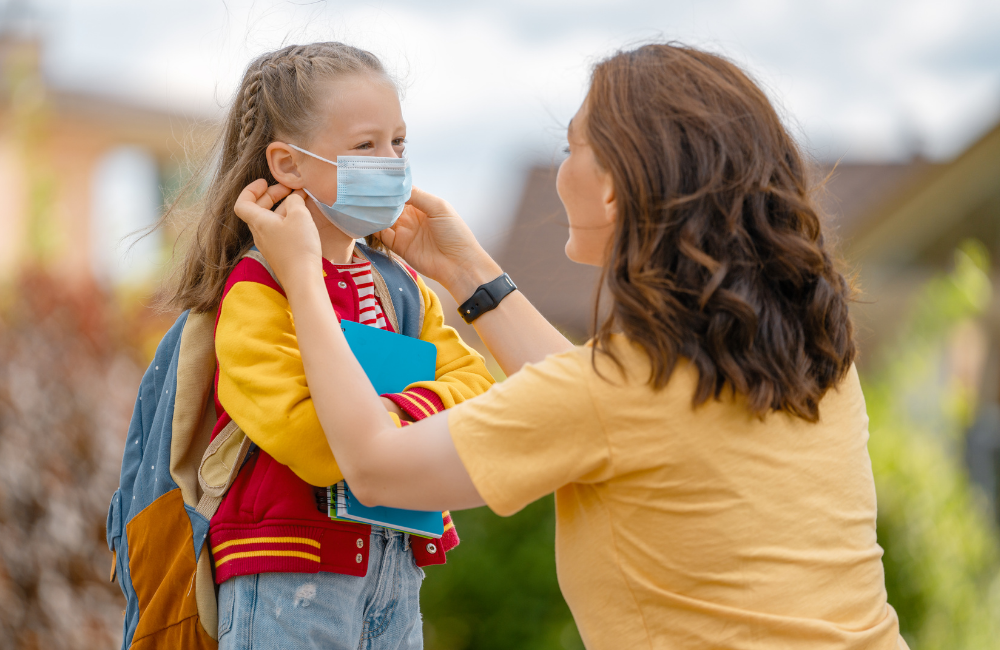March 2019, one and a half years ago, parents began to scramble to figure out how best to handle school closings all over the country. For the first time in our lifetime moms, dads, guardians, and grandparents navigated uncharted territory. Their children would not go to school the next day, nor the next, nor the next month or year. No one could have predicted that our children would be out of school for the unforeseeable future. Home schooling, hybrid, and learning pods became the new buzzwords and parents were wondering how they would continue working without childcare or an education program in place. Stress was mounting and it was clear that many families were struggling.
Fast forward to Summer 2021. Schools are announcing the reopening of the school year with continued COVID-19 protocol. Many schools are announcing the return to school five days a week with 3 feet social distancing, masks, and hand sanitizer. Currently there is no FDA approved vaccine for children under the age of 16 years old. Parents are exploring the best options for their children. Some of the choices; continue home school, private schools, or back to public school.
But during the last year and a half with pending decisions about how to handle the upcoming school year, there has been a significant rise in parent anxiety. Should their child return to school, are they comfortable with the prospect of a future vaccine, and what guidelines are they willing to accept, including wearing a mask all day. Incoming first graders may be experiencing school for the first time and other children have forgotten what it is like to be in school or social environments, creating more apprehension for parents as they notice their child’s nervousness about the return. Most parents will do anything in their power to ensure that their child receives the mental health support they need, but
will they seek out help for their own anxiety?
What is most important for parents is to manage their anxiety rather than letting it spill over onto their children. Anxiety is what happens when we are not sure what to expect and fear the worst. But this is a good reminder that parenting, even during a pandemic, is all about trying to make the best decisions we can for our children with the information we have and trusting that they are resilient, and it will be ok.
- How do parents effectively manage their anxiety? Here are some suggestions. Listen to your children without sharing your anxiety. Keep adult conversation private so that children do not need to navigate topics that are too complex or unnecessary for them to process.
- Seek a safe place to talk about your concerns about COVID-19 and school concerns with someone outside of your family. Getting another perspective about your own worries will help you be more equipped to calmly handle your children’s needs when they arrive home each day.
- Assess the risk based on whether your local area, region, and state are currently in an outbreak or not. Coronavirus risk at your child’s school depends in part on how the school manages things, but depends even more on the proportion of infected persons in the community. Effective communication helps mitigate anxiety.
- Once you have decided what type of schooling your child will receive, reassure your child that although it feels different due to the long break in schooling, your family feels confident that they will have a great school year. Embrace that confidence for yourself by writing down the pros of the decision made and review them whenever anxiety begins to creep in.
- Be careful to not allow social media or news reporting to affect your emotions and decision making. Seek out the most current information from a source you trust and make ongoing decisions after considering all that you have learned.
- Consider engaging in the practice of mindfulness, take regular cleansing breaths, and participate in activities you enjoy ensuring that you are staying present for your children and what is most important each day.
- Finally, perhaps you normally consider yourself an anxious person but seem to manage your daily life sufficiently. Those with high functioning anxiety may be good at hiding their symptoms from others and appear calm and confident. The anxiety may even drive them on to achieve rather than holding them back. Perhaps that is you. On the inside, however, you may feel scared or worried or have obsessive thoughts. You may overthink and be unable to relax. The anxiety symptoms may affect your sleep or appetite. Make note of symptoms you are experiencing. All anxiety symptoms can have significant and long-term impacts on a person’s health and relationships. Consider whether your anxiety is something you want to talk to a professional about so that you are offering your best parenting to your child.
We invite you to contact us if you have questions related to treatment for anxiety in children or adults. The staff at UMTC wish your children a safe, healthy, and fun new 2021-2022 school year.
World Music Therapy Week 2024
This blog was written by Robin Neary and Amy Thomas. Happy World Music Therapy week! It brings us joy to know that all around the world music therapists are coming together to celebrate and educate our communities on our profession. This year, Upstate Music Therapy...
The Planets: A Story Orchestra
Blog post written by Abby Hamel On April 8th, 2024, an out-of-this-world event will occur: the solar eclipse! Rochester is lucky enough to be in the path of totality for this eclipse and I can feel the excitement around me. The Planets by Helen Mortimer is the newest...
Children’s Songs That Won’t Drive You Mad
Blog written by Rebecca Szalay If you are the parent of a young child, chances are you have a CD or playlist of young children’s songs that you listen to everywhere, especially in the car. You may also find yourself singing “Baby Shark” in the grocery store because...




